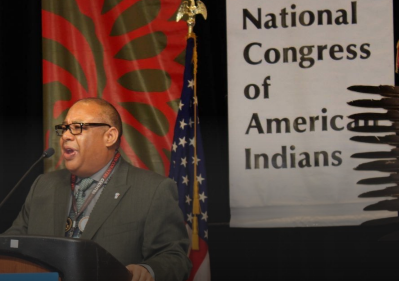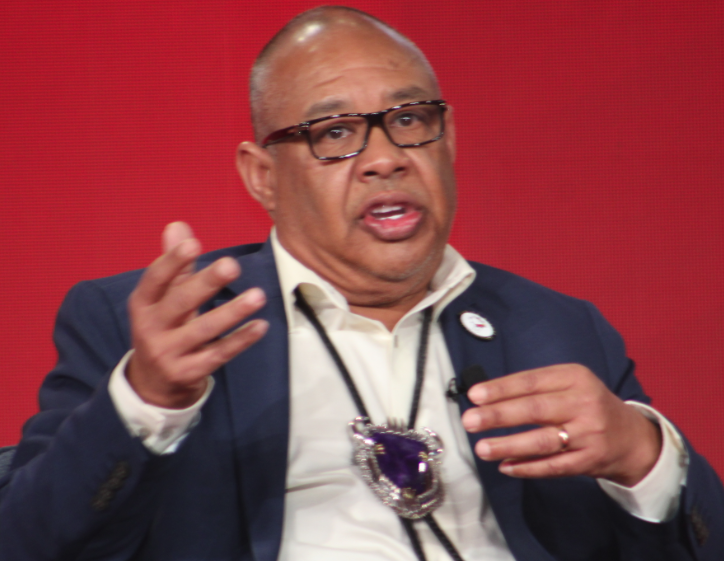
- Details
- By Levi Rickert
The charismatic leader of the Tunica-Biloxi Tribe of Louisiana, Chairman and CEO Marshall Pierite, launched his bid to be president of the National Congress of American Indians (NCAI) on Friday.
The election will be held during NCAI’s 80th Annual Convention and Marketplace in New Orleans, Louisiana from November 12 - 17, 2023. The new president will take over the leadership of NCAI that was founded in 1944 from current President Fawn Sharp, who is term-limited. NCAI is the largest and most representative American Indian and Alaska Native national organization serving the broad interests of tribal governments and communities.
Pierite, a U.S. Marine Corps veteran, brings over thirty years of experience in Tribal administration, economic development, community development, and elected leadership.
His campaign focuses on prioritizing the needs and voices of all tribal nations, with a focus on supporting Tribal women and youth, protecting Tribal lands and waterways, and upholding treaty rights.
“I am passionate about finding solutions to problems that have plagued Indian Country for generations, but I believe our Native people have always had the solutions to these challenges, and they have always been rooted in our unique cultures, traditions, and communities,”Pierite said in his announcement. “If elected NCAI president, I will work every day to strengthen tribal sovereignty, which I believe starts with protecting our future by focusing on strengthening support for our women and youth.”
Pierite's campaign seeks to strengthen tribal sovereignty, support and provide opportunities for tribal women and youth, protect the environment and traditional lands, address climate change, and promote responsible renewable energy development in collaboration with affected tribes.
Pierite's impressive tenure as the leader of the Tunica-Biloxi Tribe is marked by his exceptional ability to secure substantial grants, totaling over $70 million. His dedication to the tribe's expansion and welfare is evident through initiatives such as affordable internet access, new housing construction, and elderly care.

Beyond his local efforts, Chairman Pierite has made significant contributions at the regional and national levels. His advocacy for the interests of Indian Country led to his involvement in the historic signing of the Inflation Reduction Act in Washington, D.C. His achievements garnered him the title of the Native American Finance Officers Association's Tribal Leader of the Year in 2022, and his recent appointment to the Tribal Intergovernmental Advisory Committee highlights his ability to strengthen the relationship between tribal communities and government agencies.
“Marshall Pierite's exemplary leadership has yielded profound transformations throughout his community, the state of Louisiana, and Indian Country, leaving an indelible imprint," remarked Principal Chief of the United Houma Nation Lora Ann Chaisson said. "As an extraordinary visionary and catalyst, Marshall possesses the ability to assume the role of NCAI president, effectively championing the rights and aspirations of indigenous people nationwide.”
Pierite is the only declared candidate for the NCAI presidency to inform Native News Online.
More Stories Like This
Native News Weekly (August 25, 2024): D.C. BriefsUS Presidents in Their Own Words Concerning American Indians
Native News Weekly (January 18, 2026): D.C. Briefs
Federal Judge Orders ICE to Halt Use of Pepper Spray, Arrests of Peaceful Protesters in Twin Cities
Tunica-Biloxi Cultural Leader John D. Barbry Walks On
Help us defend tribal sovereignty.
At Native News Online, our mission is rooted in telling the stories that strengthen sovereignty and uplift Indigenous voices — not just at year’s end, but every single day.
Because of your generosity last year, we were able to keep our reporters on the ground in tribal communities, at national gatherings and in the halls of Congress — covering the issues that matter most to Indian Country: sovereignty, culture, education, health and economic opportunity.
That support sustained us through a tough year in 2025. Now, as we look to the year ahead, we need your help right now to ensure warrior journalism remains strong — reporting that defends tribal sovereignty, amplifies Native truth, and holds power accountable.
 The stakes couldn't be higher. Your support keeps Native voices heard, Native stories told and Native sovereignty defended.
The stakes couldn't be higher. Your support keeps Native voices heard, Native stories told and Native sovereignty defended.
Stand with Warrior Journalism today.
Levi Rickert (Potawatomi), Editor & Publisher


